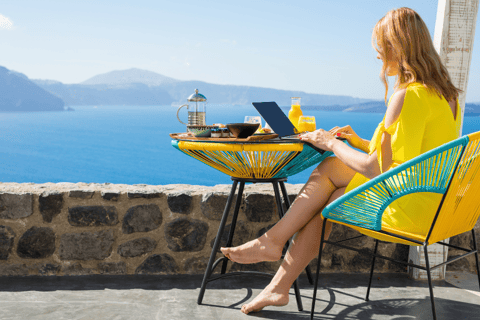Strategies for Disconnecting from Work and Fully Relaxing on Vacation
Discover practical tips for unplugging from work and embracing a true digital detox on your next vacation.
TRAVEL HACKS
Amanda Taylor
6/22/20249 min read
Do you check work emails even when you're on vacation? Many people do. Digital tech and apps make it hard to really relax. This is especially true during the pandemic. It's led to more stress, burnout, and people quitting their jobs.
But, there are ways to break free on vacation. Experts suggest a "digital detox" and engaging in mindful activities. These methods can refresh your body and mind.
Ready to learn how to enjoy your vacation more by disconnecting from work? Let's explore how to truly relax on your next trip.
The Impact of Work-Life Imbalance on Vacations
In today's world, being away from work while on vacation is tough. Technology keeps us connected all the time. Emails, messages, and work tasks keep coming. This makes it hard to relax and enjoy our time off. Not getting a real break can cause stress, burnout, and ruin chances to unwind.
Studies show it can take about 8 days of vacation to feel its full benefit. Sadly, a survey in 2018 revealed 43% of Americans struggle to stop working on their vacations. The work-life balance impact on vacations is clear. Many people face difficulty disconnecting from work during trips.
"Investing an hour in creating a plan to unplug during vacation can lead to a week of effective disconnection," notes one expert.
Before vacation, setting work boundaries can really help. Turning off work notifications and setting email on vacation reply can improve your holiday. This step aims to reduce stress, better sleep, and enhance your overall health.


The real secret to vacation peace is stopping work's calls. To really unwind, focus on self-care. Try a digital detox and set ground rules. This way, you can make the most out of your time off and come back feeling new.
Stress and Its Consequences
The pandemic has made stress on vacation much worse. Many feel burned out. This is partly because people are working too much and not taking a break. The fear of the virus has also made things hard for workers.
Because of stress, our bodies and minds suffer. We lose the ability to be creative and to solve problems. Lots of people who head out on vacation get sick right away. Their bodies are finally relaxing.
This comes after staring at screens for too long. Too much screen time leads to issues like eye strain and bad sleep. It also makes us sit around too much. All of this makes for an unhealthy situation.
"Our dependency on technology can hinder our ability to relax, unwind, and engage in activities that promote personal growth and well-being."
Our lives are more tied to technology than ever. It's hard to turn off and just relax. This means our jobs and personal time often mix.
But stepping away from tech has lots of benefits. It can help us focus better and be more creative. By taking breaks from our devices, we get a chance to think clearly and rest better. This can make our lives a lot happier.
Releasing the Pressure Valve
When you're on vacation, it's crucial to relax and let go of stress. Experts suggest fun and engaging ways to unwind. Activities that get you into a "flow" state, like rock climbing or diving into a good book, are perfect. They help put a pause on your worries and kick stress out.
Minding the here and now, through practices such as meditation or deep breathing, does wonders. It can lower your stress levels and boost your inner calm. This is super helpful if you feel stressed often or if work takes over your life. It kind of resets things for your mind and spirit.
Increased Mental Clarity: Disconnecting from screens enhances focus, creativity, and problem-solving skills.
Finding things to be thankful for and moments of peace is also key. This includes time in natural settings, bonding with loved ones, or diving into a favorite hobby. Such activities ground you and make life's stresses seem smaller.
So, when you're on your next break, try mixing these tips into your days. Bring in activities that get you in the zone. Use calming methods like deep breathing. And remember to focus on what brings you joy and peace. Your vacation can truly become a time of relaxation and renewal.


Digital Detox, Unplug and Unwind Vacation Strategies
In our fast-paced digital lives, taking a real break is key. Experts say stepping back from screens helps us relax and see the world in new ways. By cutting down digital time on vacation, we can enjoy less stress and more focus. Plus, we get to feel closer to the people we're traveling with.
To get the most out of a digital detox, you should start early. This means chilling out and turning off your devices a few days before your trip. You could try journaling, making art, or just hanging out in nature. These things help you process your feelings and get into a calmer mood.
"Disconnecting on vacation can lead to a significant reduction in stress and anxiety levels, allowing the mind and body to relax and recharge effectively."
Getting into nature and exploring your spiritual side can really help you unwind. Activities like hiking, kayaking, or just enjoying a quiet spot in the natural world can do wonders. They bring a sense of awe and peace that's perfect for a digital detox.
To really make a digital detox work, you need to set some ground rules and adjust your thinking about vacation. Stay away from work, stay in the moment, and focus on making memories with your friends and family. It might take some planning, but the joy and peace you'll find are absolutely worth it.
Take Time to Rest Before Traveling
Getting ready to relax before your trip is key. Experts suggest you start to unwind and stop using devices early. Turn off your phone after work and set your email to auto-reply. These steps help you disconnect from work. It’s good to stay away from screens. Try reading a book or doing a hobby. This can calm you and get you ready for your vacation.
Overusing the internet can cause mental health issues. These include feeling down, acting without thinking, not sleeping well, bad moods, and being very sad. Resting and turning off your digital stuff before you travel can keep these problems away. When you arrive for your vacation, you’ll feel new and full of energy.
"Starting with small digital detox practices can lead to longer, more impactful detox sessions. Unplugging during several periods, such as meals, homework, and bedtime, can significantly improve focus, academic performance, and sleep quality."
Leaning back before you go makes your trip better. You can fully be in the moment and take in the fun and peace. So, give yourself time to rest and get ready for a great vacation.
Get Creative and Seek Community
Vacations are more than just beach time or lounging. Engage in creativity and connect with others to recharge. Activities like art or crafting help you manage stress. They also improve emotional well-being.
Spending time with friends or helping others offers a strong sense of community. This is important in fighting burnout. It’s good to stay connected.
Social media may make us feel lonely, but cutting back can boost our productivity. It’s helpful to limit screen time during meals or before bed. Mindful tech use can make a difference in mental health.
Offline conversations are better for our happiness than online ones. Taking a tech-free vacation can be great for your health. It boosts both your mind and body.
"Creative activities to destress on vacation can be a game-changer for those looking to truly unwind. And social connections to combat burnout are equally important – it's about finding that balance between solitary reflection and meaningful interactions."
Activities on vacation shift focus from work to relaxation and meaning. By mixing creative pursuits and social time, you boost the value of your break. This leaves you feeling fresh when you return to work.
Embrace Nature and Spirituality
Today, it's harder to break away from work, making it critical to truly unwind. Experts say diving into nature activities lowers stress. They also suggest spiritual practices to enhance holiday relaxation.
The sound of a waterfall or the peace of a beach can let the mind unwind. In these places, people find spiritual solace, reconnecting with their bodies and minds. To boost this, meditation and deep breathing can improve mental and physical refreshment.
"Connecting with nature is one of the most effective ways to reduce stress and find a deep, lasting sense of relaxation on vacation. The healing power of natural landscapes is undeniable."
The best places for a nature-focused holiday are the Great Smoky Mountains, Acadia, and Olympic National Park. They offer tranquil escapes for people wanting to connect with nature. In contrast, places like Sedona and Ubud are great for spiritual retreats. Here, one can delve into ancient practices, finding inner peace.
By combining nature's healing power with spiritual practices, holiday-goers can truly step away from daily stress. This approach not only refreshes but also benefits health and work-life balance in the long run.


Creating Friction and Setting Expectations
Experts recommend making it hard to check work tech while on vacation. This means signing out of work accounts, turning off computers, and erasing work apps on your phone. It's also good to let your team know when they can reach you and for what reasons. This way, you can relax and not worry about work.
Time management expert Maura Nevel Thomas says not working while on vacation is crucial. Working while you're off can stop your personal growth and lead to burnout. She suggests fully turning off from work to get the most of your break.
When you're away, make it clear you're not reachable by updating your out-of-office message. You can also pass on some tasks to others and use email filters. These of improve your time off by stopping the urge to check work emails constantly. This lets you focus on resting and relaxing.
"By creating friction and setting clear expectations, you can fully disconnect from work and reap the benefits of a true vacation. Downtime is just as valuable as productivity, so embrace the opportunity to unplug and recharge."
It's crucial to respect your time away from work. Prioritizing your health over always being connected is key. With a bit of preparation and the courage to step away, you can come back from your vacation energized and focused.
Overcoming Guilt and Reframing Mindsets
Many people who are really driven at work, known as "Sensitive Strivers," often feel guilty about taking time off. This imbalance makes it hard to really unplug during a break. Yet, looking at time off as a necessary investment, not a lazy break, can change everything.
More than 60% of those in tech feel their work and life are out of balance. 80% of finance workers say they can't stop thinking about their jobs while on vacation. It's not just these areas; people with imposter syndrome often work longer to make up for feeling like they don't belong.
Experts advise celebrating your achievements to overcome guilt about relaxation. Changing how you think about not working can mean real rest. It's also key to not let your work be all you are, fighting those bad thoughts about taking breaks.
"Reframing rest and relaxation as a necessary investment, rather than a passive or lazy act, can be a game-changer for ambitious professionals."
Seeing time off in a new light can really help. The aim is to value breaks for what they are: chances to refresh, come back stronger, and focus better. This approach boosts work performance, improves choices, and supports better health all around.
Planning and Handover Before Vacation
Planning a vacation goes beyond flights and hotels. It's key to inform everyone about your time off. Let management, clients, teammates, and HR know early. This way, they can prepare for your absence. Make sure to talk with your team about who will cover for you.
It's good practice to set an out-of-office email. Also, post on other platforms that you won't be available. These steps help keep work running smoothly while you're away. Your team and clients will be ready for your time off.
"Preparing your team and clients for your vacation is just as important as the vacation itself. It sets the stage for a truly relaxing and rejuvenating experience."
Handing off tasks before you leave is important. It lets your team and clients know they're in good hands. This way, you can fully relax and show you care about your team's well-being and the work’s success.
Spending time to plan and handover well makes your break more relaxing. This proactive step improves your balance between work and life. It results in better productivity and a clearer mind when you return.
Conclusion
Vacations bring big mental and physical perks. But, for these benefits to really shine through, folks must disconnect from their jobs. Many find it hard to step away, though. About 82% still check their work emails while on break. And, almost half use their vacation days to play catch-up on their tasks.
To truly enjoy their time off, it's essential for travelers to set clear work-life boundaries. By preparing well and flipping their work switch off, they can make the most of their time away. This can lead to coming back to work feeling brand new, like they've hit a reset button.
Taking a break from screens is vital. Too much screen time can ramp up stress and drag down mood. But, by putting devices aside for a while, one can actually do better at work. They might even find themselves more creative and focused than before. A good work-life balance equals a healthier mind.
When folks at a job unplug, the whole place can feel the effects. Companies that encourage breaks from gadgets may have happier, more loyal staff. This can lower how often people leave their jobs, keeping the work atmosphere positive. Creating spaces free from tech and setting limits on digital use can do wonders for everyone's well-being.
